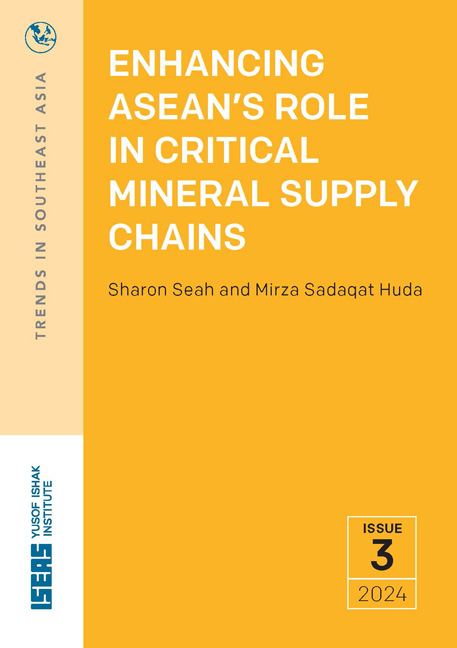Enhancing ASEAN’s Role in Critical Mineral Supply Chains
Published online by Cambridge University Press: 17 April 2024
Summary
EXECUTIVE SUMMARY
• The clean energy transition momentum is gathering pace globally, and in Southeast Asia as well. The transition is dependent on an uninterrupted supply of critical minerals and metals that are essential for the production of low-carbon technologies.
• The supply of critical minerals is impeded by several constraints. First is the dominance of a handful of countries in both the upstream and downstream parts of the supply chain. Second is the current geopolitical race to secure supplies leading to greater protectionist behaviours, exhibited through export bans and trade impediments.
• This study focuses on four selected critical minerals which are important to the region. Two criteria are used in determining a mineral having high significance: (1) There are significant deposits of it which can be tapped on to bolster Southeast Asia’s strategic position in the supply chains; and (2) It is an essential input in industries and sectors of importance in Southeast Asia. The four critical minerals examined in this study are: copper, nickel, bauxite (alumina), and rare earth elements (REEs).
• The study makes three recommendations to enhance ASEAN’s role in the critical minerals supply chains. The first addresses the insufficiency of investments in early-stage exploration and exploitation of critical minerals and, in the process, calls for an embracing of circular economy principles. The second appeals for investments at all stages, including in technology to tap into downstream activities beyond refining and purification, and in the manufacturing of component parts such as battery cell storage and permanent magnets. The third calls for improvements in sustainability management in the mining sector, which is generally extremely environmentally and socially damaging to communities.
- Type
- Chapter
- Information
- Enhancing ASEAN's Role in Critical Mineral Supply Chains , pp. vii - viiiPublisher: ISEAS–Yusof Ishak InstitutePrint publication year: 2024



